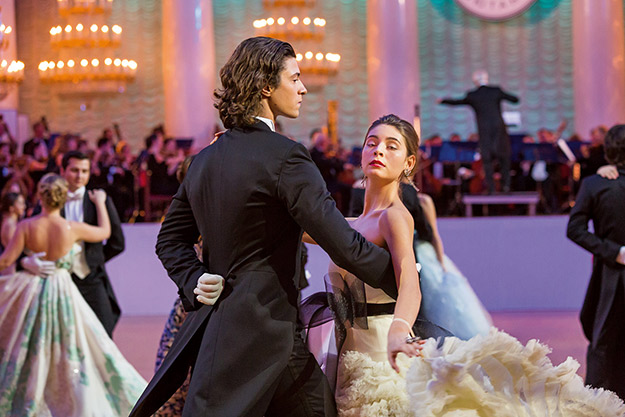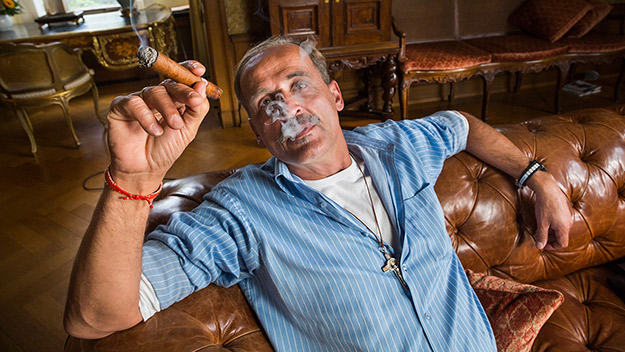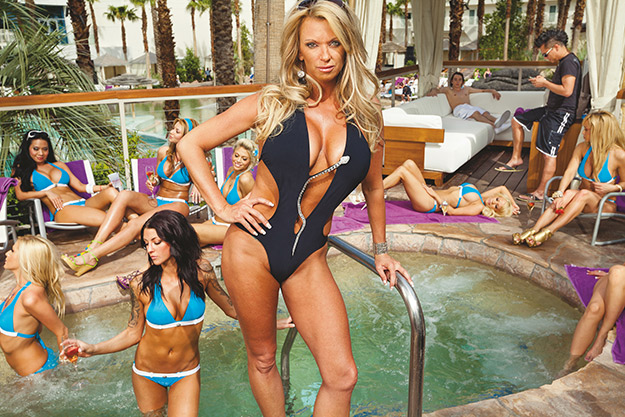SXSW Interview: Lauren Greenfield
Digital technologies facilitate our desire for communication and connection, but they also tap into many negative psychological phenomenons as well. Mimetic desire—wanting something that someone else has, because they value it—is part of the reason why Peter Thiel was so keen to invest in Facebook early on. (If you create something that taps into our basest desires, of course it’s going to be hugely popular.) This type of sharing, be it through Instagram posts or reality TV shows about the ultra-wealthy, is also part of the reason our culture is so obsessed with wealth, especially over the past 25 years. This sweeping change is documented in Lauren Greenfield’s Generation Wealth, a documentary that compiles the filmmaker and photographer’s work over this period. Drawing connections between addiction and the accumulation of wealth, celebrity, and plastic surgery, Greenfield offers an intervention into the impulses that are destroying us and the planet. I spoke with her at this year’s SXSW about her film and photographic work.

SXSW used to be a small music and film festival, and over the past 25 years it’s evolved into this huge thing with a ton of branding—I was just at the Land O’Lakes pop-up earlier today. How do you feel being here?
Well, it’s the first time I’ve shown a film at SXSW, so I don’t have a benchmark to compare it to. But when you come with a film, you don’t have that much time. I’ve been running around seeing other films, particularly female-directed films, which I was excited to learn there were a lot of this year. I’m kind of a conference or film festival junkie. I love to go even if I don’t have a film so I can actually see things. I’ve gotten a lot of inspiration from other people’s work over the years. I also make commercials and I made this spot called “Like a Girl” a few years ago that was on during the Super Bowl, and I collaborated with the same creative director now at RTA on a new spot that they’re launching tomorrow. So, I’m going to one of the brand seminars, too, and it’s about bringing art back into schools. It’s a little bit overwhelming but exciting.
This is one of several documentaries at the festival trying to deal with this new moment that we’re in with regards to Internet/Instagram celebrity and the societal shift away from hard work toward this anxiety and “hard work” about projecting the right image. Your practice isn’t exactly Marxist, but how would you describe that you’re looking at this?
Well, I want to see what movies you’re talking about. I did see Eighth Grade, which I loved. I think this work is very critical of capitalism. I studied economics and sociology and anthropology, and some of my perspective on this comes from that, but it’s a little bit more of seeing over the last 25 years how our form of capitalism has become an addictive quality of consumerism, which I guess Marx did sort of predict in the continual expansion. I’ve looked at it from a more psychological perspective, comparing it to addiction and addiction being something that comes from trying to numb pain. So I think at the heart of it we’ve lost sight of our values and, in a way, our connections to other people. Our families, our communities, what matters. I’m not really prescribing anything else. I don’t know what the answer is, except that I do think we need to wake to the forces affecting us, which we’re not always conscious of.
I feel like so much of it is this begrudging acceptance: “I hate Facebook, but I’m on it anyway.” What you’re trying to do to with this film is think about it critically and constructively and not just go along with it. Because it is tied to a large, career-spanning retrospective and book also titled Generation Wealth, at what point did you decide to insert yourself and your family into the film Generation Wealth?
I started with the project of the book. When the crash happened, it become a morality tale about the way we had been living and seemed like the consequences were the natural result that we were going to learn from. Then we didn’t really learn from it. So, I started going back through my work and feeling like I needed to process it in a different way. When The Queen of Versailles was finished in 2012, I threw myself into that full time and started the process of going back through my work and also making new work to tell the story of “generation wealth,” and how we have changed. When I went back, I realized at the time I had worked and the subjects I had covered were not just my own personal trajectory but were tied to these seismic shifts in our culture, which I’d been there to document without fully knowing what they meant. I felt like I needed to put this journey in a historical context and bring it all together.
At the same time, I was the connective thread because I was hopping from eating disorders to Russian society to new wealth in China; if you just looked at all these subjects you would not think they were connected. But I really felt like there was a connection about where we had come to in this end-of-empire kind of feeling, like the fall of Rome. It seemed like we were on an unsustainable path. I started bringing it together as a narrator, but along the way the personal started to become relevant. I think it’s because I want to be honest and transparent about my own process as an artist, that I’m somebody that is also in the culture and interacting with it in different ways.
I would talk to someone like Florian Homm [an investment banker charged with $200 million in fraud] who would tell to me about how he destroyed the relationships with his family by five hundred [business] phone calls a day. An extreme example, much more extreme than my own, but I could relate. I was on four-week trips away from my own family regularly, so it just started a process of me looking at that as well. So it evolved in a way I didn’t want to include in the beginning, and I just started seeing it as important to the storytelling.

What do you think work means at this point in history? You bring up someone like Florian Homm, who sometimes seems like he’s actually repentant and other times it’s so obvious that if he could go back to that life by pressing a button, he would do it.
That’s a really hard question because work really brings meaning to my life. I think that’s what I learned from my parents: that work was a passion and was a privilege. I think that to get to do work that you like is a huge privilege and something that is a rarity. I think part of what makes work meaningful is feeling like you’re making a difference and that was also really important to my parents—doing something for the common good. I think what was so soul-killing about Florian’s work is that it was predatory. Like he said, “I made a lot of enemies.” I think work is really important, but I also show how addiction to work has consequences and that addiction to anything always have to do with numbing other pain. For me, work is also a feminist statement. I feel like we still live in a world where a lot of women don’t work. I just got an email about grad night at my son’s school and 100% of the committee members were moms. For my mom, work was also a feminist act or statement. I think it’s connected to voice. A lot of my work is looking at voice, female voice, or lack of voice, and eating disorders. One of the most poignant points when I was making Thin, there was a woman who said she didn’t feel like she knew how to use her voice so she used her body instead and that when she saw her interview in my book she realized she had a voice. I think, for me, my work has been a voice, and that has been really empowering, but that doesn’t mean there aren’t consequences, too.
There’s this feeling now—most obviously when someone gets shamed online—that everyone must abide by this ideological purity. You can’t exert your ideals perfectly at every moment and still be a member of society.
For me, the key is men. Most men in careers travel and focus on their work and compartmentalize and can still be great dads because of this unsung hero at home. In my case, my husband has been really supportive of my work and not letting my being a mother or a wife get in the way of helping me do it all. And it’s not just my husband. It’s also my mom. It just takes a lot of other people along the way. Even just the kind of introspection I went through in this film. In terms of the consequences, I don’t think you would see a man do that. It’s just normal life. Hopefully that part can start to become a little more balanced.
There are a lot of scenes of you reviewing old photographs, circling things for the book and the exhibition. What is a captivating image to you? When you are discerning this instead of that? What guides the framing, the composition, the colors?
Above all, I’m really looking for storytelling, and storytelling that has meaning in the larger story. I’m also looking at the elements that tell that story: color, composition, lighting. The spontaneous moment is really important to me. The thing we haven’t seen before. What’s revealed. The psychology. The emotional content. There were a lot of fantastic, beautiful, greatly composed, amazing pictures that ended up on the cutting room floor in this work, and ultimately, it was about the storytelling and how they built the blocks to the bigger story. But each picture tells a story, too. There was a really high bar because I went through more than half a million pictures, and so I think I was able to take pictures that had composition and color and moments that elevated them but also told a piece of this larger story.
Did you feel like there was a different set of criteria for wealthy subjects versus poorer subjects, because different classes might have different approaches or mindsets about money? Or were these subjects inherently connected?
For me, it’s really connected. Sometimes you can’t tell the difference between fake-it-till-you-make-it and the really rich, and that was a part of the storytelling, too. In the book, I also have the help of captions and interviews to really give more context, and in the movie I think the stories can give more context. There’s the picture of Mijanou, where she’s the epitome of beauty and the California dream and living the life, and then you hear how the whole experience was scarring for her and how her beauty was her ticket to fitting in. I’m looking for the surprise there, the reveal. That conflict or tension between image and substance.

Speaking of context, out of anyone who could of spoken about the ideas in your work, why did you choose Chris Hedges? He’s the only person in the film who isn’t one of your previous photographic subjects.
I actually did interview a lot of economists and experts, but in the end I felt that the film wanted to be more personal and character-driven. They all ended up on the cutting-room floor, except Chris Hedges, whose work was so inspiring to me and so tied into ideas I was trying to bring together but in a voice so different from my own. When I read his book Empire of Illusion, it just really brought together a lot of the ideas I was thinking about with pornography and money and where American society was going and capitalism. I really loved what he said about culture and authentic culture getting destroyed by capitalism, but also authentic culture being the thing that gives us the capacity to criticize ourselves. For me, that really spoke to what I was trying to do: make critical work that allows us to deconstruct the culture that we’re in and see the matrix that is affecting us every day.
At the beginning of the ’90s, there was this idea of being at the end of history, in this postmodern moment when we were going to surpass racism and sexism—even though everyone had a reminder in November 2016 that we’re not even close. In the film, it’s intimated that when our society falls, we’re going to take the world with it. Do you really feel like that’s true, or is there a way in which things can turn around?
In Generation Wealth, we’re stuck with a lot of stuff we inherit but we also have a lot of agency and the possibility for change. Using the analogy of addiction, this idea of hitting rock-bottom, the economic crisis, can also lead to insight and can also be moments that create possibilities for change. We would not have #MeToo without Harvey Weinstein, and maybe it takes Trump to really see ourselves. I included the line from Trump’s campaign when he said, “This isn’t about me. This is about you.” We elected him and we need to look at what that means about us and our culture. I think the values of corporate capitalism are a part of that. I think social media and the Internet are a part of that. I think this individualism and us living in silos is a part of that, and I think there’s this intense loneliness. This lack of connection and losing sight of what really matters is a part of it. I do have a lot of hope because of the characters and their insights. But that hope is on one side and on the other side is that feeling that we’ve been on this course for a long time; if unchanged, I think that will take us to a terrible place.
You definitely could have put more Trump in the film because he’s the perfect embodiment of this. He thinks he’s the hardest working person of all time and deserves all of this money and wealth, but then he’s super whiny, uses loopholes, and had all of this money given to him. How did you resist that urge?
I feel like he is the embodiment of Generation Wealth and the culture, and what the movie can do is give insight into the culture that made him possible. But I don’t want to make it too much about him either, because I think he is a symptom rather than a subject of the film. I think ever since the campaign and the election there’s been this feeling of, “How long is this going to last? Is he going to be impeached? Are we going to move on from this?” It doesn’t seem like we can stay here for long. I just didn’t want the culture I was documenting—24 years of which was pre-Trump—to get overtaken by his personhood. On the other hand, I think it is a culminating point that had to be included, and that’s included in more ways than what you see. He’s in the background in a lot of characters’ stories, but, like he says, it’s about us.







